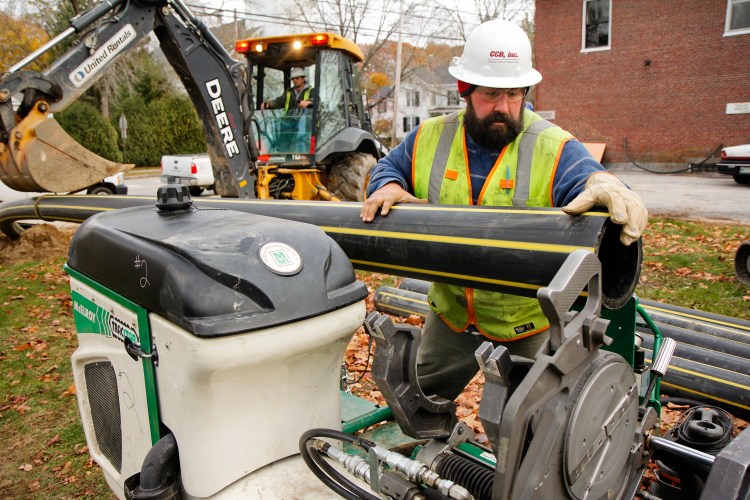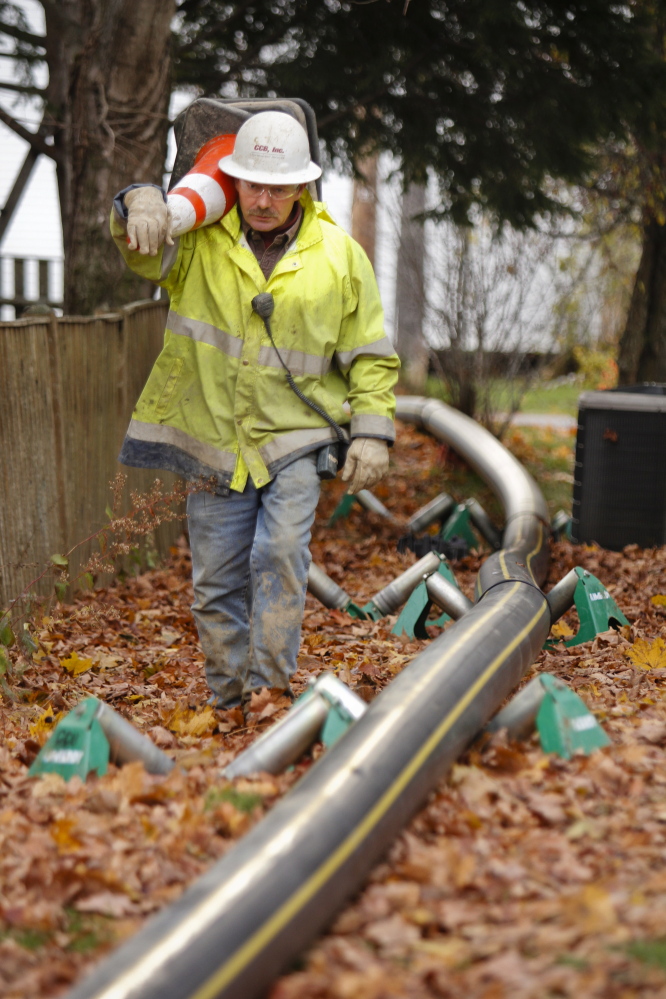CUMBERLAND — An expansive project by Summit Natural Gas of Maine to bring gas service to three suburbs north of Portland is progressing more slowly than expected, leading to complications for homeowners who sought the fuel as a blockbuster solution to high heating costs.
Summit began drilling and laying gas lines in Cumberland, Falmouth and Yarmouth in May, but has experienced construction hang-ups and other delays, forcing the company to push back the expected hookup date for some residents from September and October to December and beyond.
The waiting and frustration of customers in the suburbs mirror experiences in the Augusta area, where Summit has been working to convert residential and business customers to natural gas. Its reported mistakes during the construction process there – mostly for coming too close or drilling through other utility lines, primarily in Gardiner and Augusta – have caused Summit to be fined $150,000 by the Maine Public Utilities Commission.
This week, Summit and PUC staff will meet to discuss the fine. Meanwhile, Summit has had to moderate expectations in both expansion regions, reducing the number of customers it expects to hook up this year from 4,000 to 3,000.
One notable casualty was a deal between Summit and the University of Maine at Farmington, which this month reopened a search for an energy provider after Summit said it could not commit to building a pipeline to the town by 2016.
Although Summit could not immediately provide the number of signups in the suburbs north of Portland, the company has “seen a lot of interest from residents and businesses that want to switch to natural gas,” Mike Duguay, director of business development at Summit, said in a written statement.
“Our goal this year continues to be to serve as many customers as possible,” Duguay said. “We will continue to work as hard as possible to make sure those who previously signed up for service earlier this year will get it.”
Last heating season, average home oil prices in Maine ranged from $3.56 a gallon in the fall to $3.90 in late winter, state records show. The current statewide average is $3.12 a gallon.
Although oil prices are down from a year ago, natural gas is still cheaper by about 16 percent when compared using a common measurement of cost per 1 million British thermal units, with gas at $18.82 and oil at $22.50.
TIME SHORT AS WINTER APPROACHES
In the suburbs north of Portland, frustration from residents has bubbled up to town officials.
“I’d characterize it as a big project with many headaches, but it’s going pretty well,” said Yarmouth Town Manager Nat Tupper. “They’re not getting as much done as people would like.”
In an October newsletter to Falmouth residents, Summit released a scaled-back vision of what it will try to attain this year in the town, saying that challenging drilling conditions along with design limitations have forced it to reverse the order in which it will run some service lines. It now says it will work from west to east, and delay installation of a line on Falmouth Road until a future date.
“It is important to understand that Summit Natural Gas is interested in installing gas lines on streets where natural gas service is wanted this season,” Summit wrote in the newsletter. “More specifically, it is extremely important for residents that are located on proposed lines and who are strongly considering natural gas to sign a customer agreement as soon as possible.”
Some customers who were hoping gas would arrive in time for the upcoming winter may be out of luck, while others are struggling to find a contractor to convert their heating systems, or in some cases, install a new heating system entirely.
“It’s getting late, obviously,” said Cumberland Town Manager William Shane. “I’ve told folks that you may want to wait till spring, because you may not be able to get your contractor in (to install equipment.)”
One Cumberland Foreside resident, Robert Clark, bought his home on Conifer Ridge in June in part because he knew natural gas was coming. But Summit has pushed back its estimate for when he can convert from October to December, and Clark wonders if he will be willing to shut down his heating system for two days during the dead of winter.
Clark, who moved from Berkeley, California, and said he has used natural gas all his life, has heard how some of his neighbors are either afraid to make the switch or don’t feel confident enough yet that they’re getting a good deal on the costly conversion process.
Clark said a half-dozen heating contractors have given him wildly different estimates, from about $7,000 to $13,000, to remove his 30-year-old oil boiler and install a new system.
He said one contractor told him that response from residents has been a trickle and not the tidal wave that was expected.
“They thought it would be great,” Clark said, but “people are not responding.”
Bob Miles, a Freeport-based plumber and heating contractor, said the arrival of natural gas is not a panacea, and that just because the service is available does not mean it will be right for every customer.
Homeowners have many options for efficiency upgrades, from simple weatherization, to dual-fuel burners and boilers, to heat pumps and high-efficiency wood pellet stoves.
Natural gas is now just one of many choices, and considering the cost, many customers are thinking twice about pulling the trigger on a $10,000 heating system, especially when savings are not ironclad.
“The return on investment is really hard to figure, I think,” said Miles.
Even for himself, determining the cost-effectiveness is tough. Miles, who owns a small apartment building in Yarmouth, said that even though he’s a heating and plumbing professional, he is debating whether to convert.
“I’m doing the calculations now, and I’m not sure,” he said. “It’s much harder for the general public, and that’s my point. (With) the variables involved, it’s really difficult to make the choice.”
SUMMIT HAS MET ITS BROAD GOAL
Despite the problems, Summit has achieved the broad goal set out in its initial proposal in January 2013 of having gas flowing in Cumberland by the third quarter of 2014. But hiccups remain.
Early estimates by town and School Administrative District 51 officials said school buildings in Cumberland were expected to have gas flowing by Sept. 1, but those targets have been pushed back at least six months, said Scott Poulin, the district’s business manager.
It took the school district and the school board longer to work out the details of how it would convert its boilers and what other efficiency-related upgrades the district wanted to make at the same time, Poulin said.
The district decided to borrow $1.5 million to install new boilers, perform weatherization and upgrade other aspects of its buildings, resulting in a guaranteed savings of nearly $2.3 million during the 15-year life of the loan. After the upgrade costs are paid off, the district will continue to save money, Poulin said.
Send questions/comments to the editors.





Success. Please wait for the page to reload. If the page does not reload within 5 seconds, please refresh the page.
Enter your email and password to access comments.
Hi, to comment on stories you must . This profile is in addition to your subscription and website login.
Already have a commenting profile? .
Invalid username/password.
Please check your email to confirm and complete your registration.
Only subscribers are eligible to post comments. Please subscribe or login first for digital access. Here’s why.
Use the form below to reset your password. When you've submitted your account email, we will send an email with a reset code.